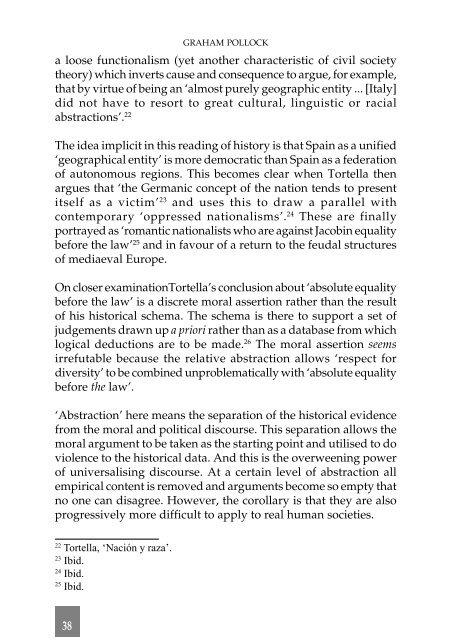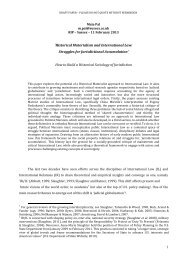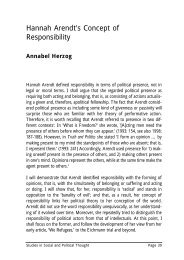Civil Society Theory and Euro-Nationalism - University of Sussex
Civil Society Theory and Euro-Nationalism - University of Sussex
Civil Society Theory and Euro-Nationalism - University of Sussex
You also want an ePaper? Increase the reach of your titles
YUMPU automatically turns print PDFs into web optimized ePapers that Google loves.
38<br />
GRAHAM POLLOCK<br />
a loose functionalism (yet another characteristic <strong>of</strong> civil society<br />
theory) which inverts cause <strong>and</strong> consequence to argue, for example,<br />
that by virtue <strong>of</strong> being an ‘almost purely geographic entity ... [Italy]<br />
did not have to resort to great cultural, linguistic or racial<br />
abstractions’. 22<br />
The idea implicit in this reading <strong>of</strong> history is that Spain as a unified<br />
‘geographical entity’ is more democratic than Spain as a federation<br />
<strong>of</strong> autonomous regions. This becomes clear when Tortella then<br />
argues that ‘the Germanic concept <strong>of</strong> the nation tends to present<br />
itself as a victim’ 23 <strong>and</strong> uses this to draw a parallel with<br />
contemporary ‘oppressed nationalisms’. 24 These are finally<br />
portrayed as ‘romantic nationalists who are against Jacobin equality<br />
before the law’ 25 <strong>and</strong> in favour <strong>of</strong> a return to the feudal structures<br />
<strong>of</strong> mediaeval <strong>Euro</strong>pe.<br />
On closer examinationTortella’s conclusion about ‘absolute equality<br />
before the law’ is a discrete moral assertion rather than the result<br />
<strong>of</strong> his historical schema. The schema is there to support a set <strong>of</strong><br />
judgements drawn up a priori rather than as a database from which<br />
logical deductions are to be made. 26 The moral assertion seems<br />
irrefutable because the relative abstraction allows ‘respect for<br />
diversity’ to be combined unproblematically with ‘absolute equality<br />
before the law’.<br />
‘Abstraction’ here means the separation <strong>of</strong> the historical evidence<br />
from the moral <strong>and</strong> political discourse. This separation allows the<br />
moral argument to be taken as the starting point <strong>and</strong> utilised to do<br />
violence to the historical data. And this is the overweening power<br />
<strong>of</strong> universalising discourse. At a certain level <strong>of</strong> abstraction all<br />
empirical content is removed <strong>and</strong> arguments become so empty that<br />
no one can disagree. However, the corollary is that they are also<br />
progressively more difficult to apply to real human societies.<br />
22 Tortella, ‘Nación y raza’.<br />
23 Ibid.<br />
24 Ibid.<br />
25 Ibid.
















